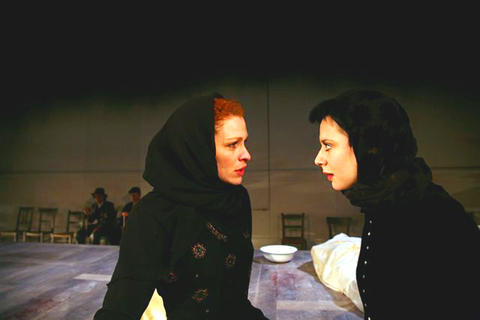Theater troupes from Germany, France, Israel and South Korea, as well as two from Taiwan, have drawn inspiration from Athol Fugard, Bernard-Marie Koltes, Sophocles, and Ingmar Bergman and others for this year's International Theater Festival.
Ticket sales have been brisk for the event, which will be held at the National Experimental Theater (國家實驗劇場) from Monday through April 13: Gutes Tun and Sizwe Banzi Is Dead (directed by world-famous theater innovator Peter Brook) have already sold out.
Sizwe Banzi Is Dead, a play written by Athol Fugard, is a morality tale about apartheid in South Africa's townships that focuses on identity, survival and race.

PHOTO: COURTESY OF NTCH
In the production, Siswe Banzi adopts the identity of a dead man so he can find a job and escape the grinding poverty of the slums. One day he enters a photography studio where he is forced to confront the deeper meaning of his actions. The performance focuses on the cost of freedom and the power of art to transcend oppression.
Roberto Zucco, written by Bernard-Marie Koltes and adapted from the original by Taiwan-based theater group Creative Society (創作社), was inspired by a real-life killer.
Directed by Wang Jia-ming (王嘉明), the plot of the 15-scene play follows the last years of serial killer Roberto Zucco's life and the motives behind his killing spree.
Three actors play 20 nameless characters and pull the audience along in an avant-garde plot that follows Zucco's prison break and subsequent crime rampage. No specific protagonist is ever seen or heard in the play, which incorporates several viewpoints and uses constantly changing scenes strewn with monologues. Performances begin on March 13.
In Gutes Tin, two women intend to do good by providing people with what they desire most. Those who want buns shall have them. Stewed apples, no problem. However, these two are not very serious and spend most of their time in front of a cabin singing, joking and brawling. Though the characters might not bring happiness to the world, Tismer's snappy dialogue in this mad comedy is sure to keep audiences crying with laughter.
Comedy is not on Hana Snir's radar. The Israeli director working in with Habimah National Theater and Cameri Theater is staging an updated version of Sophocles' tragedy Antigone.
The story revolves around Antigone, who defies human laws in order to follow a higher one. She chooses to bury her fallen brother, though he has been declared an enemy of the state by her uncle and is ineligible for any funeral rites.
Snir's adaptation from a translation by Shimon Bouzaglo is interesting because it sound like breaking news.
In Woyzeck, a shattered wooden chair represents a soldier's life. Written by Georg Buchner just before his death at the age of 23, the play is a tragedy about love, betrayal, jealousy and murder.
In the hands of South Korea's Sadari Movement Laboratory, however, chairs take on an added dimension conjuring up physical contexts and revealing the inner states of the characters. A riveting musical score by Astor Piazzolla accompanies the production, which begins on April 4.
Off Performance Workshop's (外表坊) adaptation of Ingmar Bergman's Scener Ur Ett Aktenskap (Scenes From a Marriage), which begins on April 10, makes up the final performance of the festival. The Taiwan-based theater group uses a somber interpretation of Bergman's tale of the vicissitudes of marriage and its eventual breakdown.
Tickets for the International Theater Festival are NT$500 to NT$1,000. All performances will be held at the National Experimental Theater, Taipei. Tickets can be bought at www.artsticket.com.tw.

In the March 9 edition of the Taipei Times a piece by Ninon Godefroy ran with the headine “The quiet, gentle rhythm of Taiwan.” It started with the line “Taiwan is a small, humble place. There is no Eiffel Tower, no pyramids — no singular attraction that draws the world’s attention.” I laughed out loud at that. This was out of no disrespect for the author or the piece, which made some interesting analogies and good points about how both Din Tai Fung’s and Taiwan Semiconductor Manufacturing Co’s (TSMC, 台積電) meticulous attention to detail and quality are not quite up to

April 21 to April 27 Hsieh Er’s (謝娥) political fortunes were rising fast after she got out of jail and joined the Chinese Nationalist Party (KMT) in December 1945. Not only did she hold key positions in various committees, she was elected the only woman on the Taipei City Council and headed to Nanjing in 1946 as the sole Taiwanese female representative to the National Constituent Assembly. With the support of first lady Soong May-ling (宋美齡), she started the Taipei Women’s Association and Taiwan Provincial Women’s Association, where she

Chinese Nationalist Party (KMT) Chairman Eric Chu (朱立倫) hatched a bold plan to charge forward and seize the initiative when he held a protest in front of the Taipei City Prosecutors’ Office. Though risky, because illegal, its success would help tackle at least six problems facing both himself and the KMT. What he did not see coming was Taipei Mayor Chiang Wan-an (將萬安) tripping him up out of the gate. In spite of Chu being the most consequential and successful KMT chairman since the early 2010s — arguably saving the party from financial ruin and restoring its electoral viability —

It is one of the more remarkable facts of Taiwan history that it was never occupied or claimed by any of the numerous kingdoms of southern China — Han or otherwise — that lay just across the water from it. None of their brilliant ministers ever discovered that Taiwan was a “core interest” of the state whose annexation was “inevitable.” As Paul Kua notes in an excellent monograph laying out how the Portuguese gave Taiwan the name “Formosa,” the first Europeans to express an interest in occupying Taiwan were the Spanish. Tonio Andrade in his seminal work, How Taiwan Became Chinese,